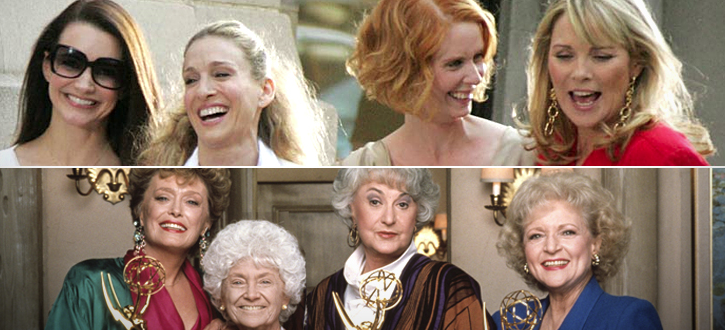
Thus, Samantha Jones (Kim Cattrall) is Blanche Deveraux (Rue McLanahan), Dorothy Zbornak (Bea Arthur) is Carrie Bradshaw (Sarah Jessica Parker), Rose Nylund (Betty White) is Charlotte York (Kristin Davis) and Sophia Petrillo (Estelle Getty) is Miranda Hobbes (Cynthia Nixon). Blanche, with her bawdy broad persona and love of sex is clearly the Samantha archetype. Dorothy, with her slightly sardonic air (not to be confused with Sophia/Miranda’s particular breed of derision), matches Carrie in outlook and manner. The supporting characters of Rose and Sophia mimic Charlotte’s prudishness and naivete and Miranda’s hard-won affection.

Just as Square Pegs is a precursor in terms of plot, The Golden Girls is a forerunner for the female prototypes that Michael Patrick King would cultivate when Sex and the City first began in 1998. The comedic factor of four women of such extreme viewpoints is present in both shows, with one prime example from The Golden Girls being that the only reason Sophia is living with any of these women is because her retirement home burned down. It’s on par with the zaniness of Carrie becoming fashion roadkill. Although Sophia’s role as Dorothy’s mother is the one divergent aspect of the show, one could say that the mother-daughter relationship of Sex and the City manifests most clearly between Samantha and Carrie (though, of course, Samantha would cringe at the thought).

What is more, the Dorothy/Carrie parallel in terms of leaving her friends quote unquote behind to be with a man is undeniable. Although both are elated and relieved to have found love, they know in their heart of hearts that their friends are, to borrow a phrase from Mr. Big (Chris Noth), “the loves of her life.” And it is in this way especially that the message of each show is extremely salient: sure, you can find romantic love, but, in the end, it’s usually the platonic love of friendship that sustains you.























[…] more than two women onscreen, which has generally been the norm save for most sitcoms (e.g. Golden Girls and Sex and the City). Is there nothing this quartet can’t do to single-handedly make feminism […]